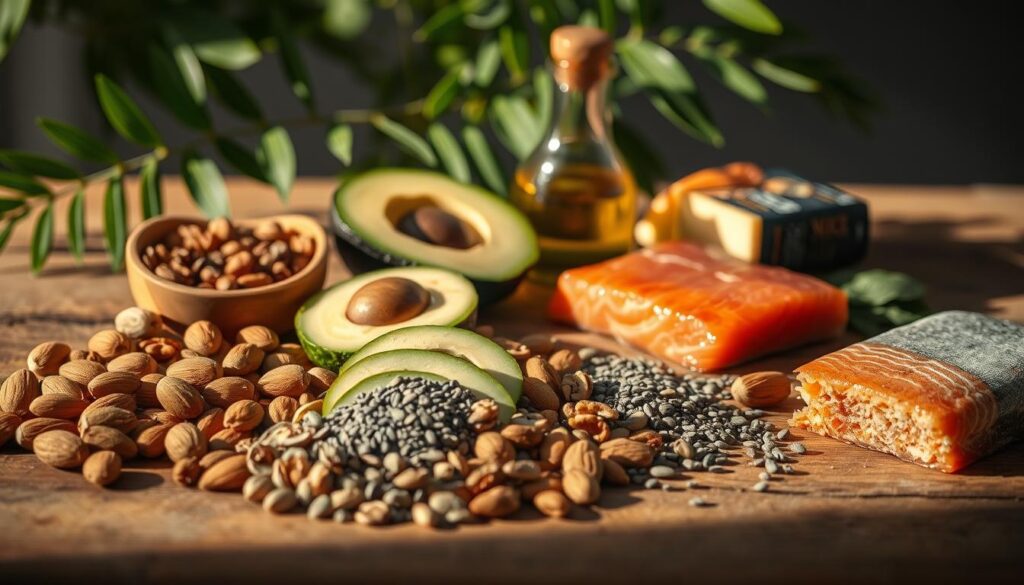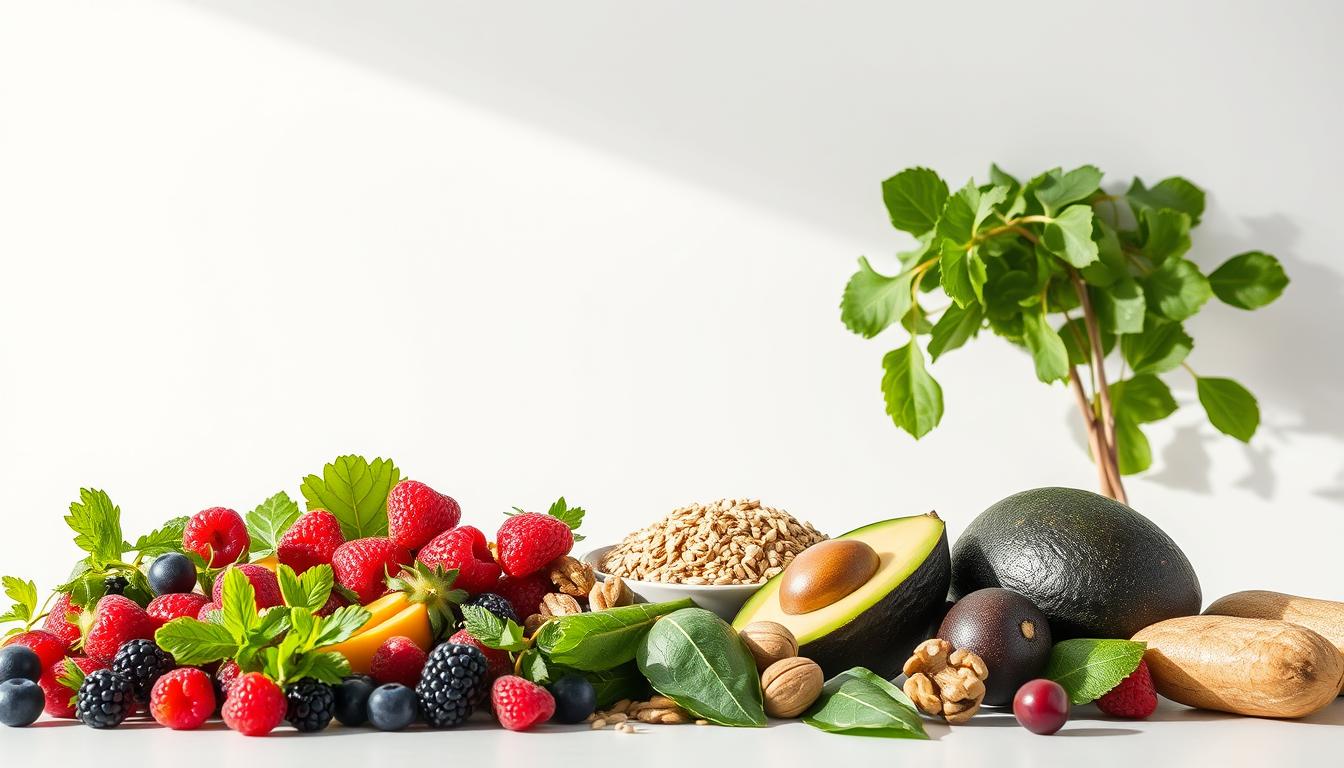This post contains affiliate links. As an Amazon Associate I earn from qualifying purchases
Maintaining a healthy heart is crucial for overall well-being. A significant aspect of heart health is diet; consuming the right foods can help prevent heart disease and keep your heart strong.
Heart-protective foods play a vital role in this dietary approach. They are rich in nutrients, antioxidants, and other beneficial compounds that support heart health.
Eating a balanced diet that includes these foods can make a significant difference in your cardiovascular health. It’s about making informed choices to nourish your heart and body.
Key Takeaways
- Incorporating heart-protective foods into your diet can help reduce the risk of heart disease.
- A balanced diet rich in fruits, vegetables, and whole grains supports heart health.
- Nuts and seeds are examples of heart-protective foods that are rich in healthy fats and antioxidants.
- Limiting intake of saturated and trans fats is crucial for maintaining heart health.
- Staying hydrated and maintaining a healthy weight are also important for heart health.
Understanding Heart Health
A healthy heart is essential for living a long and fulfilling life. Heart health is not just about avoiding heart disease; it’s about maintaining the overall well-being of your cardiovascular system.
The Importance of Cardiovascular Wellness
Cardiovascular wellness is the foundation upon which overall health is built. It encompasses not just the heart but also the blood vessels and the entire circulatory system. Maintaining cardiovascular wellness can lead to numerous cardiovascular benefits, including reduced risk of heart disease, improved circulation, and enhanced overall health.
Some key aspects of cardiovascular wellness include:
- Regular physical activity to strengthen the heart
- A balanced diet rich in fruits, vegetables, and whole grains
- Avoiding smoking and limiting alcohol consumption
- Managing stress through relaxation techniques
Common Heart Diseases in America
Heart disease is a leading cause of death in America, with various forms affecting different aspects of heart health. Understanding these conditions is crucial for heart disease prevention.
Some of the most common heart diseases include:
- Coronary Artery Disease: Caused by the buildup of plaque in the arteries, leading to reduced blood flow to the heart.
- Heart Failure: Occurs when the heart is unable to pump enough blood to meet the body’s needs.
- Arrhythmias: Conditions characterized by irregular heartbeats, which can be too fast, too slow, or irregular.
Preventing these conditions involves a combination of lifestyle changes, including diet, exercise, and regular check-ups with healthcare providers.
What Are Heart-Protective Foods?
Incorporating heart-protective foods into your daily meals is a crucial step towards achieving overall heart health. These foods are rich in nutrients that help prevent heart disease, lower cholesterol levels, and maintain healthy blood pressure.
Definition and Benefits
Heart-protective foods are those that provide essential nutrients, vitamins, and minerals that support heart health. The benefits of consuming these foods include reducing inflammation, improving blood lipid profiles, and preventing the formation of blood clots.
Nutrient-rich foods such as fruits, vegetables, whole grains, and lean proteins are at the core of a heart-healthy diet. These foods are not only beneficial for the heart but also contribute to overall well-being.
Key Nutrients for Heart Health
Certain nutrients play a significant role in maintaining heart health. These include omega-3 fatty acids, fiber, antioxidants, and potassium. Understanding the importance of these nutrients can help in making informed dietary choices.
| Nutrient | Benefit | Food Sources |
|---|---|---|
| Omega-3 Fatty Acids | Reduces inflammation, improves heart health | Salmon, walnuts, chia seeds |
| Fiber | Lowers cholesterol levels, improves digestion | Oats, barley, fruits, vegetables |
| Antioxidants | Protects against cell damage, reduces oxidative stress | Berries, leafy greens, other fruits and vegetables |
| Potassium | Helps lower blood pressure, supports heart function | Potatoes, bananas, avocados |
By incorporating these nutrient-rich foods into your diet, you can significantly enhance your heart health and reduce the risk of cardiovascular diseases.
Top Fruits for Heart Health
Incorporating the right fruits into your diet can significantly boost your heart health. Fruits are packed with essential nutrients, fiber, and antioxidants that help protect against heart disease.
Berries: Antioxidants for the Win
Berries, including blueberries, strawberries, and raspberries, are among the top fruits for heart health. They are rich in antioxidants, which help combat free radicals that can damage heart cells. The fiber content in berries also aids in lowering cholesterol levels.
- Blueberries are known for their high antioxidant content, which can help reduce inflammation and improve cardiovascular health.
- Strawberries are rich in vitamin C and fiber, making them an excellent choice for heart health.
- Raspberries contain a high amount of fiber and antioxidants, supporting overall heart wellness.
Citrus Fruits: Vitamins and Fiber
Citrus fruits like oranges, grapefruits, and lemons are not only refreshing but also beneficial for heart health. They are high in vitamin C, potassium, and fiber, all of which contribute to a healthier heart.
- Oranges are a great source of vitamin C and potassium, helping to lower blood pressure.
- Grapefruits contain naringenin, a flavonoid that has been shown to help lower cholesterol.
- Lemons are rich in vitamin C and flavonoids, supporting heart health and overall wellness.
By incorporating a variety of these heart-healthy fruits into your diet, you can take a significant step towards maintaining a healthy heart and reducing the risk of cardiovascular diseases.
Vegetables That Support Heart Function
Eating a variety of vegetables is key to supporting heart function and overall cardiovascular health. Vegetables are packed with vitamins, minerals, and antioxidants that help protect the heart from disease.
Leafy Greens: A Nutrient Powerhouse
Leafy greens such as spinach, kale, and collard greens are rich in nutrients that support heart health. They are high in dietary nitrates, which have been shown to improve blood flow and lower blood pressure. Additionally, leafy greens are rich in antioxidants and fiber, contributing to their heart-protective effects.
Cruciferous Vegetables: More Than Just Crunch
Cruciferous vegetables like broccoli, cauliflower, and Brussels sprouts are not only crunchy and delicious but also packed with nutrients that support heart health. They contain sulforaphane, a compound that has been shown to have anti-inflammatory properties, reducing the risk of heart disease. These vegetables are also rich in fiber, vitamins, and minerals that contribute to overall cardiovascular wellness.
Incorporating a mix of leafy greens and cruciferous vegetables into your diet can significantly enhance your heart health. These vegetables are not only nutrient-rich but also versatile, making them easy to add to a variety of dishes.
Whole Grains for a Strong Heart
Whole grains, such as oats and quinoa, are packed with nutrients that support cardiovascular wellness. Incorporating these grains into your daily meals can be a straightforward way to enhance your heart health.
Oats: A Breakfast Essential
Oats are a fantastic source of fiber, particularly a type known as beta-glucan, which has been shown to help lower cholesterol levels. Starting your day with a bowl of oatmeal can be a heart-healthy choice.
- Rich in fiber
- Helps lower cholesterol
- Supports healthy blood sugar levels
To make oats a staple in your diet, consider the following tips:
- Add fruits or nuts to your oatmeal for extra flavor and nutrition.
- Use oats in baking, such as in muffins or cookies.
- Try overnight oats as a quick and easy breakfast option.
Quinoa: A Protein-Packed Grain
Quinoa is not only a complete protein but also rich in fiber, magnesium, and potassium, making it an excellent choice for heart health. Its versatility allows it to be incorporated into a variety of dishes, from salads to main courses.
Benefits of Quinoa:
- Complete protein source
- Rich in fiber and minerals
- Supports heart health through its nutrient profile
As noted by a study published in a leading health journal, “Diets rich in whole grains like quinoa have been associated with a reduced risk of heart disease.”
“A diet rich in whole grains, such as quinoa, can significantly reduce the risk of cardiovascular disease.”
Incorporating whole grains like oats and quinoa into your diet is a simple yet effective strategy for supporting heart health. By making a few simple changes to your daily meals, you can take a significant step towards a healthier heart.
Healthy Fats for Cardiovascular Protection
Eating the right kinds of fats can help lower cholesterol and improve heart health. Healthy fats are not only delicious, but they also play a crucial role in maintaining a healthy heart. Incorporating these fats into your diet can be a simple yet effective way to protect your cardiovascular system.

Avocado: Creamy and Heart-Friendly
Avocados are rich in monounsaturated fats, which are known to help lower LDL (bad) cholesterol and raise HDL (good) cholesterol. This can significantly reduce the risk of heart disease. Avocados are also a good source of fiber, vitamins, and minerals that support overall heart health.
Some ways to include avocados in your diet are:
- Add sliced avocado to your sandwiches or toast
- Make a fresh guacamole dip for vegetables or whole-grain crackers
- Blend avocado into smoothies for a creamy texture
Nuts and Seeds: Snack Smart
Nuts and seeds are not only a tasty snack but are also packed with healthy fats, protein, and fiber. Almonds, walnuts, and chia seeds are particularly beneficial for heart health due to their high content of omega-3 fatty acids and antioxidants.
Here are some tips for snacking on nuts and seeds:
- Choose unsalted and unsweetened options to avoid added sodium and sugar
- Mix different types of nuts and seeds for a varied nutrient intake
- Use them as a topping for salads or yogurt parfaits
By incorporating these healthy fats into your diet, you can take a significant step towards protecting your heart and enhancing your overall well-being.
The Role of Fish in Heart Health
Eating fish regularly can be a simple yet effective way to support cardiovascular wellness. Fish is rich in nutrients that are essential for maintaining a healthy heart.
Omega-3 Fatty Acids Explained
One of the key nutrients found in fish is omega-3 fatty acids. These are essential fatty acids that the body cannot produce on its own and must be obtained through diet. Omega-3s are known to help reduce inflammation, lower triglycerides, and prevent blood clots, all of which contribute to a reduced risk of heart disease.
The three main types of omega-3 fatty acids are EPA (eicosapentaenoic acid), DHA (docosahexaenoic acid), and ALA (alpha-linolenic acid). While ALA is found in plant-based foods like flaxseeds and walnuts, EPA and DHA are primarily found in fatty fish.
Best Fish Options for Your Heart
Not all fish are created equal when it comes to heart health. Fatty fish are particularly beneficial due to their high omega-3 content. Here are some of the best fish options for heart health:
| Fish Type | Omega-3 Content | Heart Health Benefits |
|---|---|---|
| Salmon | High in EPA and DHA | Reduces inflammation, improves heart function |
| Sardines | Rich in EPA and DHA | Lowers triglycerides, supports overall heart health |
| Mackerel | High in omega-3s | Helps prevent blood clots, reduces heart disease risk |
Incorporating these fish into your diet can be as simple as having a serving two to three times a week. Grilling, baking, or poaching are healthy cooking methods that help retain the nutritional value of the fish.
Spices and Herbs: Heart-Healthy Flavors
Spices and herbs not only add flavor to your food but also provide numerous heart-protective benefits. Incorporating them into your meals can be a simple and delicious way to support cardiovascular health.
Turmeric: Anti-Inflammatory Properties
Turmeric contains curcumin, a compound known for its potent anti-inflammatory and antioxidant properties. Reducing inflammation is crucial for heart health, as it can help prevent the development of cardiovascular diseases. “Turmeric has been used for centuries in traditional medicine for its healing properties,” and modern research supports its benefits for heart health.
To incorporate turmeric into your diet, try adding it to soups, stews, or curries. You can also make a turmeric tea by mixing the spice with hot water and a squeeze of lemon. Start with small amounts and adjust to taste, as turmeric can be quite potent.
Garlic: A Flavorful Cardiovascular Booster
Garlic has been shown to have numerous cardiovascular benefits, including reducing blood pressure and cholesterol levels. The active compound allicin is responsible for many of garlic’s heart-protective effects. As noted by health experts, “Garlic’s ability to lower blood pressure can significantly reduce the risk of heart disease.”
To maximize garlic’s benefits, consume it raw or lightly cooked. Adding minced garlic to your meals can not only enhance flavor but also support heart health. Consider making a garlic-infused oil for a healthy addition to your cooking.
By incorporating heart-healthy spices and herbs like turmeric and garlic into your diet, you can add flavor and support cardiovascular wellness. Experiment with different recipes and find ways to make these ingredients a regular part of your meals.
The Impact of Dairy on Heart Health
As we explore the components of a heart-healthy diet, the place of dairy products is a crucial consideration. Dairy has been a staple in many diets around the world, providing essential nutrients like calcium, vitamin D, and protein. However, its impact on heart health has been a subject of debate.

Low-Fat vs. Full-Fat Dairy Products
The discussion around dairy and heart health often centers on whether low-fat or full-fat dairy products are more beneficial. Low-fat dairy products, such as skim milk and reduced-fat cheese, have been recommended for reducing saturated fat intake, which is linked to heart disease. On the other hand, some research suggests that full-fat dairy products may not be as harmful as once thought, with some studies indicating they could be part of a healthy diet.
However, the American Heart Association still recommends choosing low-fat or fat-free dairy products to reduce the risk of heart disease. It’s essential to consider the overall dietary pattern rather than focusing solely on dairy fat content.
Alternatives to Dairy for Heart Health
For those who are lactose intolerant or prefer a plant-based diet, there are several alternatives to dairy that can support heart health. These include:
- Almond milk and other nut milks
- Soy milk and tofu
- Coconut milk and yogurt (in moderation due to high saturated fat content)
- Oat milk and other grain milks
When choosing dairy alternatives, it’s crucial to select products that are fortified with calcium and vitamin D to match the nutritional profile of dairy. Additionally, being mindful of added sugars and saturated fats in these alternatives is vital for maintaining a heart-healthy diet.
In conclusion, dairy products can be part of a heart-healthy diet when consumed mindfully. Whether you choose low-fat or full-fat dairy, or opt for dairy alternatives, the key is to focus on overall dietary patterns and nutrient balance to support heart disease prevention.
Creating Heart-Healthy Meals
Incorporating heart-protective foods into your daily meals can be a straightforward process. By focusing on nutrient-rich foods and simple recipes, you can create delicious and healthy meals for the whole family.
Simple Recipes for the Whole Family
Preparing heart-healthy meals doesn’t have to be complicated. Here are some simple and tasty recipe ideas:
- Grilled salmon with roasted vegetables
- Oatmeal with berries and nuts
- Quinoa salad with avocado and citrus
These recipes incorporate foods for heart health like omega-3 rich fish, fiber-rich oats, and nutrient-dense quinoa. They’re perfect for busy weeknights or lazy weekends.
Meal Prep Ideas for Busy Lifestyles
Meal prep is a great way to ensure you’re eating heart-healthy meals even on the busiest days. Here are some tips:
- Plan your meals for the week ahead
- Shop for fresh, whole ingredients
- Prep meals in advance, such as cooking grains or roasting vegetables
By having healthy meals ready to go, you’ll be less tempted to rely on processed or fast foods. This can make a big difference in your overall heart health.
| Meal Prep Idea | Benefits | Tips |
|---|---|---|
| Quinoa and Vegetable Bowls | High in fiber and nutrients | Roast a big batch of vegetables on the weekend |
| Salmon and Avocado Salad | Rich in omega-3s and healthy fats | Prepare the salad dressing in advance |
| Oatmeal with Fruit and Nuts | High in fiber and antioxidants | Cook a big batch of oatmeal and refrigerate or freeze |
By incorporating these meal prep ideas and simple recipes into your routine, you’ll be well on your way to creating heart-healthy meals that nourish your body and delight your taste buds.
Lifestyle Changes for Heart Health
A heart-healthy lifestyle involves more than just diet; it includes regular physical activity and stress management. By incorporating these elements, individuals can significantly improve their cardiovascular wellness.
Exercise and Physical Activity
Regular exercise is a cornerstone of heart health. It helps maintain a healthy weight, improves circulation, and strengthens the heart. Aim for at least 150 minutes of moderate-intensity aerobic activity or 75 minutes of vigorous-intensity aerobic activity per week, or a combination of both, along with muscle-strengthening activities on two or more days a week.
Physical activity can be incorporated into daily life in various ways, such as walking, cycling, or swimming. Finding an enjoyable activity can make it easier to stick to a routine. For those with busy schedules, even short bursts of activity, like taking the stairs instead of the elevator, can contribute to overall heart health.
Reducing Stress for a Healthier Heart
Chronic stress can have a negative impact on heart health, increasing the risk of heart disease. Engaging in stress-reducing activities such as meditation, yoga, or deep breathing exercises can help mitigate this risk. These practices not only reduce stress but also improve overall well-being.
In addition to these activities, maintaining a healthy work-life balance is crucial. Ensuring adequate sleep, taking breaks during the workday, and engaging in hobbies can all contribute to reduced stress levels and improved heart health.
By combining regular physical activity with effective stress management, individuals can make significant strides in protecting their heart health. These lifestyle changes, along with a heart-healthy diet, form a comprehensive approach to cardiovascular wellness.
Conclusion: Make Heart-Protective Foods a Daily Habit
Incorporating heart-protective foods into your daily diet can significantly enhance your cardiovascular wellness. By making informed choices, you can nourish your heart and body, reducing the risk of heart diseases.
Nourishing Your Heart with Every Meal
To make heart-healthy eating a habit, start by introducing more fruits, vegetables, whole grains, and healthy fats into your meals. Berries, leafy greens, and nuts are excellent additions. Planning your meals around these heart-protective foods can simplify the process.
Long-Term Benefits of a Heart-Centric Diet
Adopting a heart-healthy diet can lead to numerous long-term benefits, including improved cardiovascular health, reduced risk of chronic diseases, and enhanced overall well-being. By focusing on heart-protective foods, you’re investing in a healthier future.
Embracing a heart-healthy diet is a journey that requires commitment, but the rewards are well worth the effort. By incorporating heart-protective foods into your daily habits, you’re taking a significant step towards a healthier, happier life.
FAQ
What are heart-protective foods?
How do heart-protective foods help with cardiovascular benefits?
Can a heart-healthy diet help prevent heart disease?
What are some key nutrients for heart health?
Are there any cholesterol-lowering foods that can be included in a heart-healthy diet?
How can I incorporate heart-protective foods into my daily diet?
Can lifestyle changes, along with a heart-healthy diet, improve overall heart health?
This post contains affiliate links. As an Amazon Associate I earn from qualifying purchases



